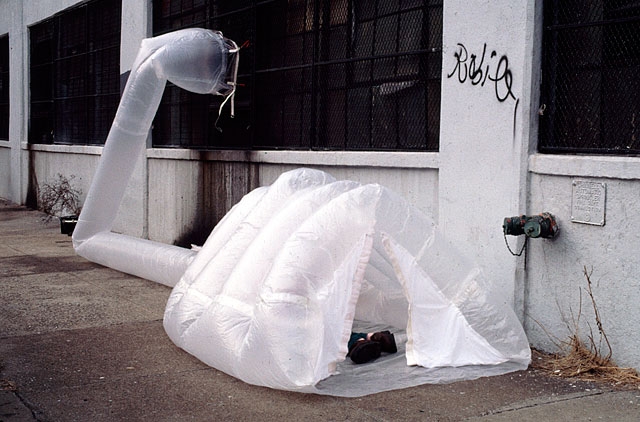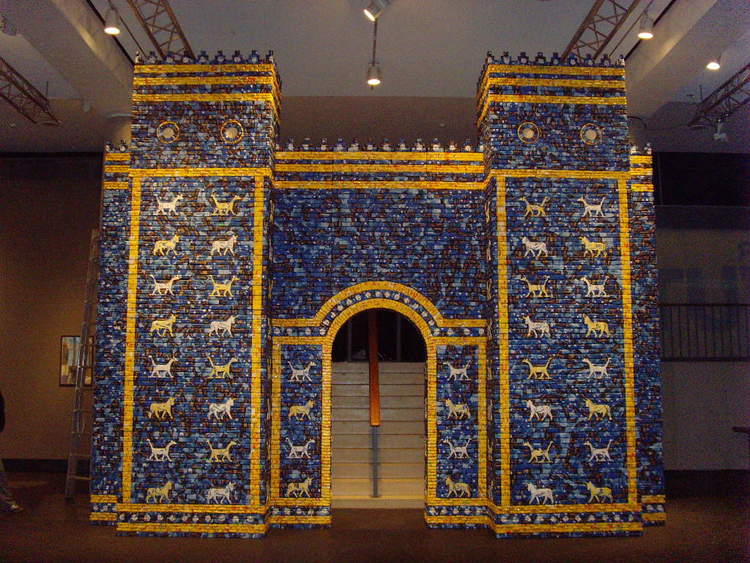
Michael Rakowitz. paraSITE, 2000. Plastic bags, polyethylene tubing, hooks, tape. Courtesy of the artist.
Since 1998, the artist Michael Rakowitz has been constructing his paraSITE structures and placing them in public, in New York City, Boston, Cambridge (Massachusetts), and Baltimore. The structures, made of plastic bags, tubing, and tape, are adhered to the exterior outtake vents of the heating, ventilation, and air-conditioning systems of buildings, capturing the discarded warm air to inflate and heat the structures. Referring to the designs as “double membrane systems,” Rakowitz intends for them to function as temporary and transportable shelters for the homeless; his website states that they have been distributed to at least thirty homeless people. But what is one to make of the title of these structures, in relation to those who are intended to use and even live in them? While the title paraSITE could refer to an exploitative situation, in which the parasite benefits at the expense of the host, and could function as an indictment of the users of Rakowitz’s design, the artist seems more interested in placing the host (a residential or office building) and the guest (a homeless person) side by side, in order to build compassion across sites of potential conflict and to ask the public to empathize with both the resources and the people who are usually considered no longer valuable—what and who we have let slip away and discarded.

Michael Rakowitz. Enemy Kitchen, 2003-ongoing. Cooking Workshop; Enemy Kitchen staff, comprised of Iraqi refugees and American veterans of the Iraq War, outside of Milo’s Pita Place, an Iraqi restaurant in Chicago’s Rogers Park neighborhood that operates the truck. Courtesy of the artist.
Many of Rakowitz’s works are permeated by questions about the relationship between guest and host; as an Iraqi-American artist, Rakowitz has dealt with this topic in his work with clarity, consistency, and care for the past twenty years. Since 2003, Rakowitz has hosted the Enemy Kitchen, a pop-up food truck that serves Baghdadi recipes that the artist has collected with his mother. As the artist explains, “Preparing and then consuming this food opens up a new route through which Iraq can be discussed…through that most familiar of cultural staples: nourishment.”1 Currently on view at the Museum of Contemporary Art, Chicago (MCA), Enemy Kitchen deploys the meal as a symbolic gift, which establishes guests and hosts who enact an intimate relationship, centered around one of the most basic human needs, and in which one side gives something that cannot be returned in an exact material exchange. How does one reconcile the complex political relationship between unwilling host and hostile guest that has existed between Iraq and the United States for the past fifteen years with the generous act of hospitality that Rakowitz offers? With Enemy Kitchen, the artist again places hostility and hospitality side by side, asking viewers to consider an alternative discourse.
Similarly to the paraSITE works, the installation May the Arrogant Not Prevail (2010), also on view at the MCA, makes use of discarded materials to comment on Western and Middle Eastern hosting relationships. Made of found Arabic packaging and newspapers, glue, cardboard, and wood, the work is a scaled-down reconstruction of the Ishtar Gate. The real gate, a central feature of ancient Babylon, now resides in the Pergamon Museum in Berlin, one example of a conflicted fate that reflects the twentieth-century imperialist practice of cultural-artifact seizure and affects conversations about artifact repatriation. Through his work, Rakowitz asks how we can care for what we’ve discarded, and opens new possibilities to reimagine previously hostile relationships.
Michael Rakowitz: Backstroke of the West is on view at the Museum of Contemporary Art Chicago September 16, 2017 – March 4, 2018.
1. Michael Rakowitz, Enemy Kitchen.




